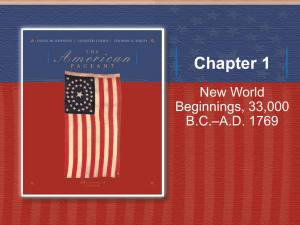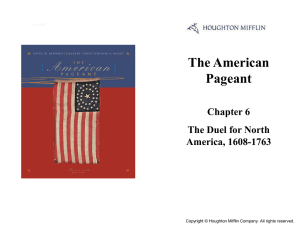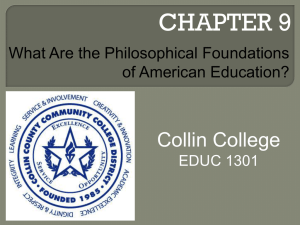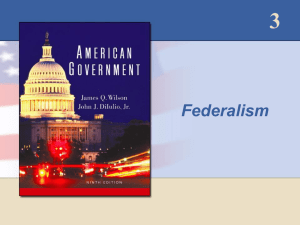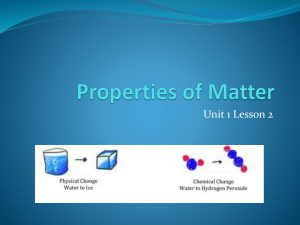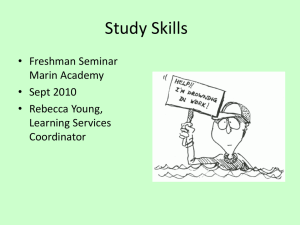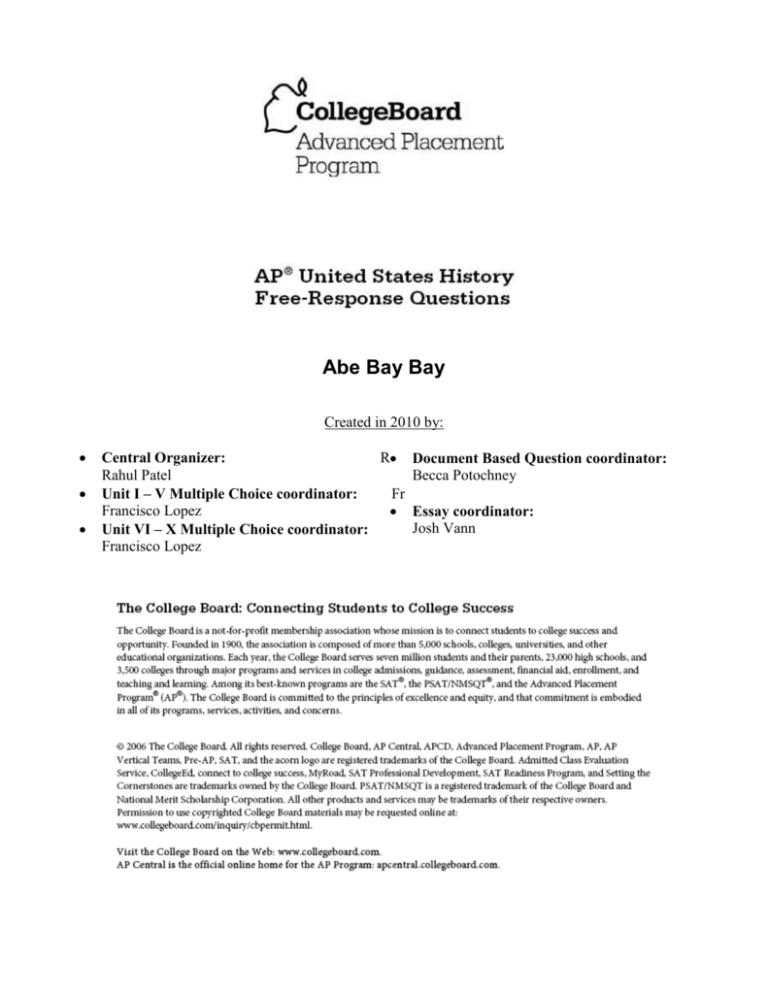
Abe Bay Bay
Created in 2010 by:
Central Organizer:
R Document Based Question coordinator:
Rahul Patel
Becca Potochney
Unit I – V Multiple Choice coordinator:
Fr
Francisco Lopez
Essay coordinator:
Josh Vann
Unit VI – X Multiple Choice coordinator:
Francisco Lopez
UNITED STATES HISTORY
SECTION I
Time – 55 minutes
80 Questions
Directions: Each of the questions or incomplete statements below is followed by five suggested answers or
completions. Select the one that is best in each case and then fill in the corresponding oval on the answer sheet.
1.
Which of the following New World plants
revolutionized the international economy?
A. maize
B. potatoes
C. beans
D. tomatoes
E. all of the above.
2.
The major issue that delayed ratification of
the Articles of Confederation concerned
A. taxation.
B. tariff policy.
C. monetary policy.
D. western lands.
E. monetary standards
7.
America’s initial Open Door policy was
essentially an argument for
A. free trade.
B. spheres of influence.
C. military occupation.
D. exclusive trade concessions.
E. the principle of self-determination.
3.
All of the following are guarantees provided
by the Bill of Rights except
A. the right to vote for all citizens.
B. freedom of speech.
C. freedom of religion.
D. freedom of the press.
E. right to a trial by a jury.
8.
The nonbusiness group that realized the
most significant, lasting gains from World
War I was
A. labor.
B. blacks.
C. the Ku Klux Klan.
D. women.
E. veterans.
4.
By the 1840s voter participation in the
presidential election reached
A. nearly 50 percent.
B. 25 percent.
C. 40 percent.
D. 15 percent.
E. nearly 80 percent.
9.
Senator McCarthy’s anticommunist crusade
ended when he
A. began to attack the personal
integrity of his critics.
B. alleged that there were communists
in Hollywood.
C. alleged that there were communists
in the Foreign Service.
D. alleged that many college
professors were communists.
E. alleged that there were communists
in the army.
5.
6.
According to the principle of “popular
sovereignty,” the question of slavery in the
territories would be determined by
A. the most popular national leaders.
B. a national referendum.
C. congressional legislation.
D. a Supreme Court decision.
E. the vote of the people in any given
territory.
In the 1896 case of Plessy v. Ferguson, the
Supreme Court ruled that
A. African-Americans could be denied
the right to vote.
B. segregation was unconstitutional.
C. “separate but equal” facilities were
constitutional.
D. the Fourteenth Amendment did not
apply to African-Americans.
E. literacy tests for voting were
constitutional.
10. Modern conservatism springs from
A. a repudiation of government.
B. a disapproval of priorities and
strategies from the New Deal.
C. a disapproval of priorities and
strategies from the Great Society.
D. a dislike of technology.
E. all of the above.
11. The Great Awakening
salaries by ten percent.
A. undermined the prestige of the learned clergy in the C. working hours were cut back by the
colonies.
railroad companies.
B. split colonial churches into several competing
D. the railroad workers refused to
denominations.
cross the picket lines of cargo
C. led to the founding of Princeton, Dartmouth, and
loaders.
Rutgers colleges.
E. the railroads tried to hire Chinese
D. was the first spontaneous mass movement of the
workers.
American people.
E. all of the above.
17. Teddy Roosevelt’s role in the Panamanian
Revolution involved
12. In a sense, the history of the United States
A. using American naval forces to
began with the
block Colombian troops from
A. Revolutionary War.
crossing the isthmus and crushing
B. July 4, 1776 signing of the
the revolt.
Declaration of Independence.
B. ordering an economic embargo of
C. Boston Tea Party.
Colombia.
D. founding of the first colony in
C. remaining perfectly neutral.
1607.
D. sending in American ground
E. fall of Quebec and Montreal.
troops.
E. funding the Panamanian rebels.
13. Washington’s Farewell Address in 1796
A. warmly endorsed the appearance of
18. President Hoover’s approach to the Great
two contending political parties in
Depression was to
America.
B. warned against the dangers of
A. leave the economy alone to work
permanent foreign alliances.
itself out of trouble.
C. was delivered to a joint session of
B. nationalize major industries.
Congress by Washington himself.
C. encourage the states to stimulate
D. proposed a two-term limitation on
spending.
the presidency.
D. blame it on big business.
E. adopt unprecedented federal
E. all of the above
initiatives to combat it.
19. In the 1950s, the key to economic growth
14. Andrew Jackson and his supporters disliked
rested in
the Bank of the United States for all of the
following reasons except it
A. the chemical industry.
A. minted gold and silver coins but
B. the aeronautics and space industry.
issued no paper money.
C. the automobile industry.
B. controlled much of the nation’s
D. federal highway construction.
gold and silver.
E. electronics.
C. was a private institution.
D. foreclosed on many western farms.
20. The razor-thin election of 2000 between
E. put public service first, not profits.
George W. Bush and Al Gore was finally
resolved when
15. The man who opened Japan to the United
A. the U.S. Supreme Court ended
States was
further vote recounts in Florida,
A. William Walker.
giving Bush the electoral vote
B. Franklin Pierce.
victory.
C. Lafcadio Hearn.
B. Al Gore conceded that Bush had
D. Clayton Bulwer.
won a majority of the popular votes
E. Matthew Perry.
and should therefore be declared
the winner.
16. The railroad of 1877 started when
C. the Florida State Supreme Court
A. President Hayes refused to use
determined that Bush had won the
troops to keep the trains running.
state by a few hundred votes.
B. the four largest railroads cut
Copyright© Houghton Mifflin Company. All rights reserved.
D. Congress settled the issue by
accepting Bush’s Florida electors
rather than Gore’s.
E. Bush agreed to appoint Democrats
to the cabinet and govern as a
“compassionate conservative” if
Gore would drop his electoral
challenge.
B. the importance of honor to
northerners.
C. the fact that, despite divisions over
slavery, the House of
Representatives would unite to
expel a member for bad conduct.
D. the fact that passions over slavery
were becoming dangerously
inflamed in both North and South.
E. the division between the House and
the Senate over slavery.
21. Culture in colonial America
A. involved heavy investment in art.
B. was generally ignored and unappreciated.
C. showed its native creativity in architecture. 26. During the Gilded Age, most of the railroad
D. was always important to the colonists.
barons
E. for a long time rejected any European in
A. rejected government assistance.
fluence.
B. built their railroads with
government assistance.
22. The First Continental Congress
C. relied exclusively on Chinese labor.
A. was attended by delegates from
D. refused to get involved in politics.
each of the thirteen colonies.
E. focused on public service.
B. adopted a moderate proposal for
establishing a kind of home rule for
27. Progressivism
the colonies under British direction.
A. supported many reforms advocated
C. made a ringing declaration of
by feminists.
America’s independence from
B. offered little to the ever-growing
Britain.
women’s movement.
D. called for a complete boycott of
C. supported only the demand for
British goods.
woman suffrage.
E. adjourned shortly after convening.
D. followed examples set by women’s
reform movements in Europe.
23. One of George Washington’s major
E. reflected the views of workingcontributions as president was
class women.
A. keeping the nation out of foreign
28. Franklin Roosevelt’s New Deal programs
wars.
A. were almost no help for the poor.
B. the signing of Jay’s Treaty.
B. did not end the Depression.
C. his advice against forming
C. created the biggest federal deficits
permanent alliances with foreign
in American history.
nations.
D. aided only farmers.
D. securing a pledge from Britain to
E. aided the poor but not the middle
stop arming Indians on the western
class.
lands.
E. establishing the political party
29. The Cuban missile crisis resulted in all of
system.
the following except
A. U.S. agreement to abandon the
24. The “Father of the Factory System” in the
American base at Guantanamo.
United States was
B. the removal of Nikita Khrushchev
A. Robert Fulton.
from power in the Soviet Union.
B. Samuel F. B. Morse.
C. a U.S. promise not to invade Cuba.
C. Eli Whitney.
D. an ambitious program of military
D. Samuel Slater.
expansion by the Soviet Union.
E. Thomas Edison.
E. withdrawal of U.S. missiles in
Turkey.
25. The clash between Preston S. Brooks and
Charles Sumner revealed
30. One reason Black politicians became more
A. the seriousness of political
successful by the 1990s is
divisions in the North.
A. they relied on racial solidarity.
Copyright© Houghton Mifflin Company. All rights reserved.
B. bloc voting.
C. they appealed to a wide variety of
voters.
D. they began running for office in the
South.
E. all of the above.
31. Perhaps the most important single action of
the Second Continental Congress was to
A. select George Washington to head
the army.
B. draft new appeals to the king.
C. adopt measures to raise money.
D. postpone an immediate demand for
independence.
E. support independence.
32. Thomas Jefferson’s “Revolution of 1800”
was remarkable in that it
A. moved the United States away from
its democratic ideals.
B. marked the peaceful and orderly
transfer of power on the basis of
election results accepted by all
parties.
C. occurred after he left the
presidency.
D. caused America to do what the
British had been doing for a
generation regarding the election of
a legislative body.
E. was in no way a revolution.
33. The “cult of domesticity”
A. gave women more opportunity to
seek employment outside the home.
B. resulted in more pregnancies for
women.
C. restricted women’s moral influence
on the family.
D. glorified the traditional role of
women as homemakers.
E. was especially strong among rural
women.
34. For a majority of northerners, the most
outrageous part of the Supreme Court’s
ruling in the Dred Scott case was
A. that as a slave Scott had no right to
sue in federal court.
B. that Scott did not automatically
become free when his owner took
him through free states and
territories.
C. that Congress had never had the
power to prohibit slavery in any
territory.
D. that slaveowners had the right to
flood into territories so as to control
popular sovereignty.
E. that the Bill of Rights did not apply
even to free African-Americans.
35. America’s first billion-dollar corporation
was
A. General Electric (GE).
B. Standard Oil.
C. American Telephone and
Telegraph (AT&T).
D. The Union Pacific Railroad.
E. United States Steel.
36. President Taft’s foreign policy was dubbed
A. big-stick diplomacy.
B. the Open Door policy.
C. the Good Neighbor policy.
D. dollar diplomacy.
E. sphere-of-influence diplomacy.
37. The phrase “Hundred Days” refers to
A. the worst months of the Great
Depression.
B. the time it took for Congress to
begin acting on President
Roosevelt’s plans for combating
the Great Depression.
C. the first months of Franklin
Roosevelt’s presidency.
D. the “lame-duck” period between
Franklin Roosevelt’s election and
his inauguration.
E. the time that all banks were closed
by FDR.
38. In the final analysis, Lyndon Johnson’s
Great Society programs
A. did no good at all.
B. actually increased the poverty rate.
C. proved that poverty could not be
papered over with greenbacks.
D. won some noteworthy battles in
education and health care.
E. were heavily overfunded.
39. The Declaration of Independence did all of
the following except
A. invoke the natural rights of
humankind to justify revolt.
B. catalog the tyrannical actions of
King George III.
C. argue that royal tyranny justified
revolt.
Copyright© Houghton Mifflin Company. All rights reserved.
D. blame the colonies’ problems on
the British Parliament.
E. condemn the abolition of valued
laws.
40. As chief justice of the United States, John
Marshall helped to ensure that
A. states’ rights were protected.
B. the programs of Alexander
Hamilton were overturned.
C. the political and economic systems
were based on a strong central
government.
D. both the Supreme Court and the
president could rule a law
unconstitutional.
E. Aaron Burr was convicted of
treason.
41. Religious revivals of the Second Great
Awakening resulted in
A. little increase in church
membership.
B. a strong religious influence in
many areas of American life.
C. surprisingly few humanitarian
reforms.
D. greater attention to church history
and doctrine.
E. all of the above.
42. European powers favored a civil war in the
United States because
A. they could regain control of a
divided America.
B. war would weaken the United
States’ power in the Western
Hemisphere.
C. war could end the concept of
balance of power in the Americas.
D. such a conflict would halt the flow
of blacks to Canada.
E. two North American nations would
have weaker economies than one.
43. The major factor in drawing country people
off the farms and into the big cities was
A. the development of the
skyscraper.
B. the availability of industrial
jobs.
C. the compact nature of those large
communities.
D. the advent of new housing
structures known as dumbbell
tenements.
E. the lure of cultural excitement
44. Woodrow Wilson’s New Freedom
A. advocated social-welfare programs.
B. opposed fragmentation of big
industrial combines.
C. favored small enterprise and
entrepreneurship.
D. supported minimum-wage laws.
E. opposed banking and tariff reform.
45. Roosevelt’s recognition of the Soviet Union
was undertaken partly
A. in order to win support from
American Catholics.
B. because the Soviet leadership
seemed to be modifying its harsher
communist policies.
C. in hopes of developing a diplomatic
counterweight to the rising power
of Japan and Germany.
D. to win favor with American liberals
and leftists.
E. to open opportunities for American
investment in Siberian oil fields.
46. The “three P’s” that largely explain the
cultural upheavals of the 1960s are
A. poverty, political radicalism, and
protest against authority.
B. public schools, parietal rules, and
parental restrictions.
C. population bulge, protest against
Vietnam, and prosperity.
D. patriotism, prowar enthusiasm, and
perfectionism.
E. the “pill,” pot, and popular rock
music.
47. America’s first entangling alliance was with
A. Great Britain.
B. France.
C. Spain.
D. Holland.
E. Russia.
48. Napoleon chose to sell Louisiana to the
United States because
A. he had suffered misfortunes in Santo Domingo.
B. he hoped that the territory would
one day help America to thwart the
ambitions of the British.
C. he did not want to drive America
into the arms of the British.
D. yellow fever killed many French troops.
E. all of the above.
Copyright© Houghton Mifflin Company. All rights reserved.
49. Two areas where women in the nineteenth
century were widely thought to be superior
to men were
A. physical strength and mental vigor.
B. moral sensibility and artistic refinement.
C. political ability and organizational
shrewdness.
D. sexual appetite and physical desire.
E. economic competitiveness and
capacity for education.
50. In order to persuade the Border States to
remain in the Union, President Lincoln
A. relied solely on moral appeal.
B. used only totally legal methods.
C. guaranteed that they could keep
slavery permanently.
D. never had to use troops.
E. declared martial law where needed.
51. According to the social gospel,
A. workers should be content with
their station in life.
B. the church should not concern itself in
the social affairs of the world.
C. clergy should try to reach the
socially prominent.
D. Christianity would replace
socialism.
E. the lessons of Christianity should
be applied to solve the problems
manifest in slums and factories.
52. Teddy Roosevelt’s New Nationalism
A. pinned its economic faith on competition.
B. opposed consolidation of labor unions.
C. favored the free functioning of
unregulated and unmonopolized
markets.
D. supported a broad program of
social welfare.
E. favored state rather than federal
government activism.
53. America’s neutrality effectively ended when
A. Japan attacked Pearl Harbor.
B. Germany attacked Poland.
C. the conscription law was passed in
1940.
D. France fell to Germany.
E. Italy “stabbed France in the back.”
54. Title IX was passed by Congress in 1972 to
A. prohibit sex discrimination in any
federally funded education program
or activity.
B. guarantee women equal pay for
equal work.
C. prohibit any form of sexual
harassment or sexual innuendoes
on the job.
D. establish quotas for women in
sports, business, and government
positions.
E. protect women’s access to birth
control and abortion.
55. The Founding Fathers failed to eliminate
slavery because
A. they did not truly believe in
democracy.
B. a fight over slavery might destroy
national unity.
C. they were more concerned with
securing equality for women.
D. the North began to rely more
heavily on slave labor.
E. economic conditions would not
allow such a loss.
56. The War of 1812 was one of the worstfought wars in United States history because
A. Native Americans supported the
British.
B. too much national anger prevented
clear thinking on strategy.
C. of the poor state of the economy.
D. of a non-existent milita.
E. of widespread disunity.
57. Perhaps the slave’s greatest horror, and the
theme of Harriet Beecher Stowe’s Uncle
Tom’s Cabin, was
A. the enforced separation of slave
families.
B. slaveowners’ frequent use of the
whip.
C. the breeding of slaves.
D. having to do the most dangerous
work on the plantation.
E. forcible sexual assault by
slaveowners.
58. When it was issued in 1863, the
Emancipation Proclamation declared free
only those slaves in
A. the Border States.
B. slave states that remained loyal to
the Union.
C. United States territories.
D. states still in rebellion against the
United States.
Copyright© Houghton Mifflin Company. All rights reserved.
E. areas controlled by the Union army.
59. The root cause of the American farmers’
problem after 1880 was
A. urban growth.
B. foreign competition.
C. the declining number of farms and
farmers.
D. the shortage of farm machinery.
E. overproduction of agricultural
goods.
60. Of Woodrow Wilson’s Fourteen Points, the
one that he hoped would provide a system of
collective security was the
A. reduction of armaments.
B. League of Nations.
C. abolition of secret treaties.
D. guarantee of freedom of the seas.
E. principle of national selfdetermination of peoples.
61. The 1941 lend-lease program was all of the
following except
A. a focus of intense debate between
internationalists and isolationists.
B. a direct challenge to the Axis
dictators.
C. the point when all pretense of
American neutrality was
abandoned.
D. the catalyst that caused American
factories to prepare for all-out war
production.
E. another privately arranged
executive deal, like the destroyersfor-bases trade.
62. During the Senate Watergate hearings, one
of the most damaging revelations for
Richard Nixon was that
A. Vice President Spiro Agnew had
accepted bribes.
B. he frequently used obscenities and
racial slurs.
C. the special prosecutor was about to
resign owing to lack of White
House cooperation.
D. Congress intended to invoke the
Twenty-fifth Amendment.
E. his conversations in person and on
the telephone had been recorded on
tape.
63. The Era of Good Feelings
A. was characterized by the absence of
any serious problems.
B. was noted for cooperation between
the Democratic and Republican
parties.
C. marked a temporary end to
sectionalism.
D. was a troubled period.
E. saw the start of the Whig party.
64. Slaves fought the system of slavery in all of
the following ways except by
A. slowing down the work pace.
B. refusing to get an education.
C. sabotaging expensive equipment.
D. pilfering goods that their labor had
produced.
E. running away when possible.
65. The Confederacy enlisted slaves into their
army
A. a month before the war ended.
B. at the beginning of the war.
C. as a response to the Emancipation
Proclamation.
D. to help in the attack on Gettysburg.
E. in recognition that the idea of
slavery was wrong.
66. The Dawes Severalty Act was designed to
promote Indian
A. prosperity.
B. annihilation.
C. assimilation.
D. culture.
E. education.
67. The United States’ main contributions to the
Allied victory in World War I included all of
the following except
A. battlefield victories.
B. foodstuffs.
C. oil.
D. munitions.
E. financial credit.
68. Japanese-Americans were placed in
concentration camps during World War II
A. due to numerous acts of sabotage.
B. in retaliation for the placement of
Americans in concentration camps
by the Japanese.
C. As a result of anti-Japanese
prejudice and fear.
D. because many were loyal to Japan.
E. all of the above.
Copyright© Houghton Mifflin Company. All rights reserved.
69. With the demise of the Federalist party,
A. the Democratic-Republicans established one-party rule.
B. another party arose very quickly to take its place.
C. little political trouble ensued.
D. sectionalism disappeared.
E. the Whig party rose to take its place.
70. the 1840s, the view that God had ordained the growth of an American nation stretching across North
America was called
A. continentalism.
B. isolationism.
C. anglophobia.
D. Divine Mandate.
E. Manifest Destiny.
71. The greatest achievements of the Freedmen’s Bureau were in
A. its distribution of land.
B. education.
C. the provision of food and clothing.
D. helping people to find employment.
E. All of these
72. A major factor in the shift in American foreign policy toward imperialism in the late nineteenth
century was
A. the need for additional population.
B. the desire for more farmland.
C. the construction of an American-built isthmian canal between the Atlantic and Pacific.
D. the closing of the frontier.
E. the need for overseas markets for increased industrial and agricultural production.
73. The red scare of 1919–20 was provoked by
A. the wartime migration of rural blacks to northern cities.
B. the strict enforcement of prohibition laws.
C. evolutionary science’s challenge to the biblical story of the Creation.
D. the public’s association of labor violence with its fear of revolution.
E. the threat created by the Communist Revolution in Russia.
.
74. The tide of conquest in the Pacific was turned following the Battle of
A. Leyte Gulf.
B. Bataan and Corregidor.
C. the Coral Sea.
D. Midway.
E. Guadalcanal.
75. Monroe Doctrine was
A. a striking new departure in American foreign policy.
B. quickly codified into international law.
C. a binding pledge on each subsequent presidential administration.
D. an expression of the illusion of deepening American isolationism from world affairs.
E. a commitment by the United States to internationalism.
76. The Wilmot Proviso
A. symbolized the burning issue of slavery in the territories.
B. gained House and Senate approval in 1846.
C. settled once and for all the issue of slavery in California.
D. allowed slavery in the territory taken from Mexico in 1848.
Copyright© Houghton Mifflin Company. All rights reserved.
E. left open the issue of slavery in New Mexico and Utah.
77. Radical congressional Reconstruction of the South finally ended when
A. the South accepted the Thirteenth, Fourteenth, and Fifteenth Amendments.
B. the last federal troops were removed in 1877.
C. President Johnson was not reelected in 1868.
D. the Supreme Court ruled in Ex parte Milligan that military tribunals could not try civilians.
E. blacks showed they could defend their rights.
78. The Teller Amendment
A. guaranteed the independence of Cuba.
B. made Cuba an American possession.
C. directed President McKinley to order American troops into Cuba.
D. appropriated funds to combat yellow fever in Cuba.
E. granted the U.S. a base at Guantanamo Bay.
79. Before the automobile, the
industry dominated the
dominated the American economy.
A. railroad
B. farming
C. oil
D. steel
E. electricity
80. The post-World War II prosperity in the United States was most beneficial to
A. African-Americans.
B. labor unions.
C. women.
D. Hispanics.
E. farm
END OF SECTION I
Copyright© Houghton Mifflin Company. All rights reserved.
UNITED STATES HISTORY
SECTION II
Part A
(Suggested writing time – 45 minutes)
Percent of Section II score – 45
Directions: The following question requires you to construct a coherent essay that integrates your interpretation of
Documents A-H and your knowledge of the period referred to in the question. High scores will be earned only by
essays that both cite key pieces of evidence from the documents and draw on outside knowledge of the period.
1. The Progressive Era was a period of reform in the United States. Using the provided documents and
your prior knowledge of this time period, discuss the ways in which the Progressive Era altered the role
of women in the United States.
Document A:
Document B:
\
Document C
Copyright© Houghton Mifflin Company. All rights reserved.
“Referring to woman's sphere in life, I'll say that woman is always right. For twenty-five years I've been a
woman's rights man. I have always believed, long before my mother died, that, with her gray hairs and
admirable intellect, perhaps she knew as much as I did. Perhaps she knew as much about voting as I.
I should like to see the time come when women shall help to make the laws. I should like to see
that whiplash, the ballot, in the hands of women. As for this city's government, I don't want to say much,
except that it is a shame - a shame; but if I should live twenty-five years longer - and there is no reason why
I shouldn't - I think I'll see women handle the ballot. If women had the ballot to-day, the state of things in
this town would not exist.”
- Votes for Women Speech by Mark Twain, January 20th, 1901
Document D:
Document E:
Document F:
Copyright© Houghton Mifflin Company. All rights reserved.
Document G:
Document H:
END OF DOCUMENTS FOR QUESTION 1
Copyright© Houghton Mifflin Company. All rights reserved.
UNITED STATES HISTORY
SECTION II
Part B and Part C
(Suggested total planning and writing time – 70 minutes)
Percent of Section II score – 55
Part B
Directions: Choose ONE question from this part. You are advised to spend 5 minutes planning and 30 minutes
writing your answer. Cite relevant historical evidence in support of your generalizations and present your arguments
clearly and logically.
1.
How did the puritan religion set the standard for the beginnings of the American society?
2.
In your opinion, whose side had more validity, the confederacy or the union?
Part C
Directions: Choose ONE question from this part. You are advised to spend 5 minutes planning and 30 minutes
writing your answer. Cite relevant historical evidence in support of your generalizations and present your arguments
clearly and logically.
3.
Which of the “Progressive Presidents” was the most effective? Explain your answer.
4.
What factors contributed to creating The Great Depression?
END OF EXAMINATION
Copyright© Houghton Mifflin Company. All rights reserved.

